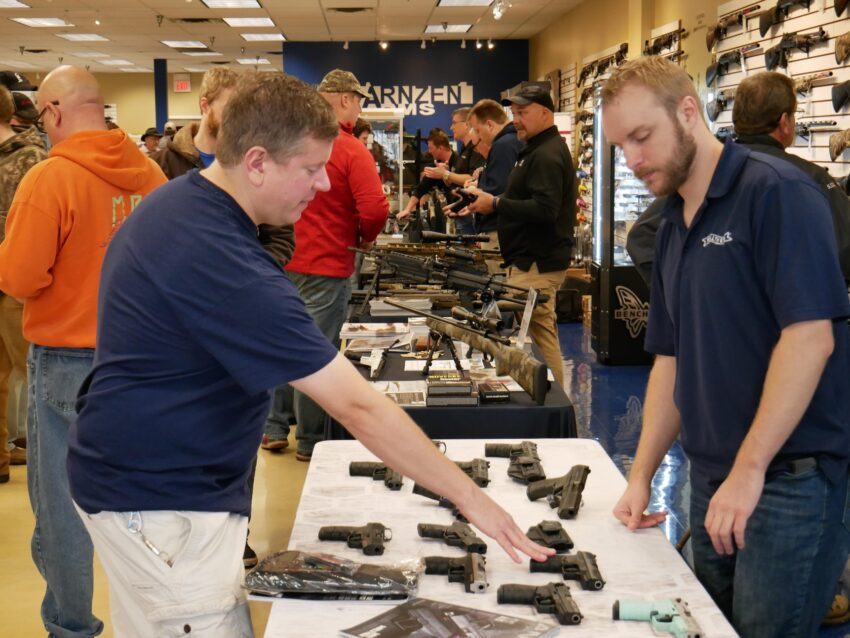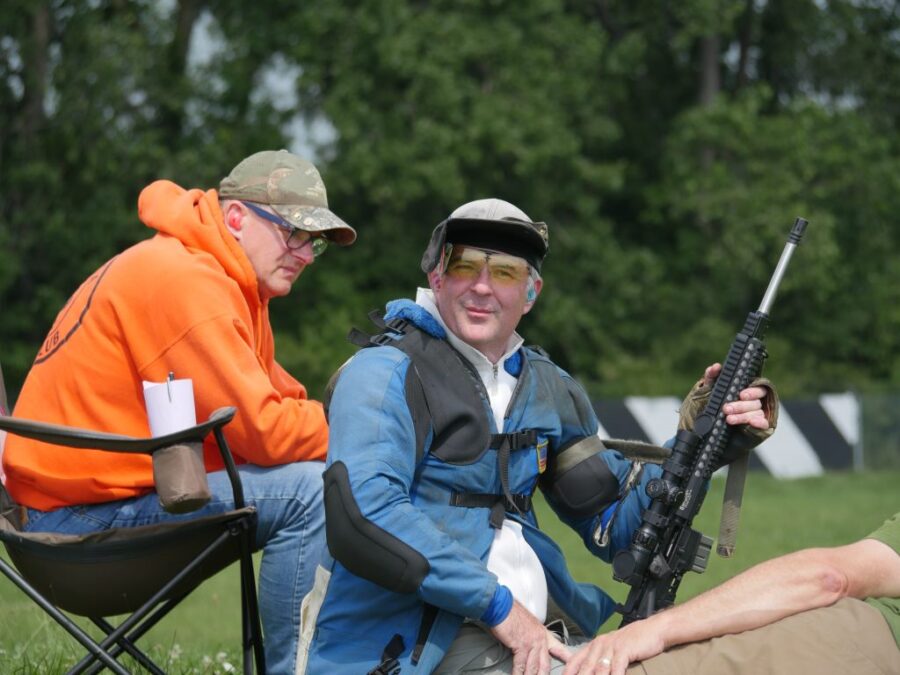Summer Slump? Host Events!
The Goal Of Store Events & Promotions: Expand Awareness, Profits Or Both?

Arnzen Arms' annual anniversary event brings in more than 2,000 customers eager to connect with manufacturer
reps. According to Marketing Manager Mark Stevens, these events generate a lot of enthusiasm from his customer
base: “From an industry perspective, putting the manufacturers and the customers together is just rocket fuel.”
With summer swiftly approaching, it’s a good time to consider those special sales events that attract droves of customers and manufacturers’ representatives by offering deep discounts, seasonal sales, raffles and lots of free swag.
Of course, if you’ve waited this long to plan a summer sales event, you don’t have a lot of time to lose. Successful events — particularly if you want to invite manufacturing reps — often require considerable advanced planning to make sure everything goes off without a hitch.
Built-In Events
Talking with several gun shops around the nation, it’s quickly apparent everyone approaches these events from a different direction. There are sales events built around store anniversaries, local hunting seasons and national holidays.
At Arnzen Arms in Eden Prairie, Minn., the store’s October anniversary demands the most attention. On a single Saturday, they’ll bring in a range of manufacturer’s reps and offer sales — drawing in 2,000 or more customers.
“It’s as much customer appreciation as it is anything,” noted Mark Stevens, the store’s marketing manager.
And in Yuma, Ariz., Sprague’s Sports looks annually to Sept. 1 and the opening of dove season. To kick off the hunting season, they bring in a variety of manufacturers, sell a themed T-shirt, offer an assortment of giveaways and even sponsor a biggest (dove) breast contest.
“People come from all around the United States to hunt the white-winged dove. So we hold our version of a big deer contest,” confirmed Owner Richard Sprague.
Maybe a big single event isn’t ideal for your store. Such is the case with Frank’s Gun Shop in Amsterdam, N.Y.
Owner John Havlick prefers to focus on a series of smaller events keyed to holidays like Memorial Day and the Fourth of July. They’ll offer discounts — particularly on ammo — for several days surrounding those holidays. July 4 often includes a gun raffle.
Even if customers can’t make it into the store, he’s likely to honor his sale prices beyond the terms advertised the week before the event. It’s not unusual for a customer who’s going to be out of town that week to ask for the discount.
“Of course, I’m not going to say ‘no.’ I just have a big heart for everybody,” he said.
Bring In The Reinforcements
If your event is large enough, you’ll likely need to pull in all of your available employees to deal with the crowds. With some advanced planning and cooperation from some of the manufacturers you stock, you can boost your ranks and give customers another reason to drop by the store.
At Arnzen Arms’ anniversary event — along with smaller events during the year — they invite a range of vendors and some local/national shooting celebrities. Companies like GLOCK, SIG SAUER and JP Rifles have set up booths, while competitive shooters like Josh Froelich offer tips and advice.
With both groups — vendors and shooters — the objective is to bring expertise into the store. They want company representatives, for example, who can speak with authority about the how and why behind production decisions.
“The opportunity for customers to get close to JP, or another company, and ask the questions they want to ask is worth its weight in gold,” said Stevens. “From an industry perspective, putting the manufacturers and the customers together is just rocket fuel.”
While competition shooters might not appeal to every customer, their presence can mean a lot to those in the same niche. Maybe it’s only 15 people who come in to meet with the shooter, but it’s an opportunity to reach a new group of customers.
“That’s direct access to somebody who they already know and respect as a teacher,” Stevens reasoned. “What do you think is going to happen? Out of appreciation or obligation, they’re going to give you a shot.”
In Arizona, Sprague sees company reps (from Beretta, Benelli and Winchester) as more expertise behind the sales counter.
“Our customers are used to talking to us,” Sprague explained. “Sometimes it’s valuable when they can get the perspective from a factory guy or someone who represents the factory.”
It doesn’t even need to be a gun company that joins your effort. Each year, Sprague works with a local Catholic high school on its annual fundraiser, which includes raffling a large number of guns. The school sets up a booth in front of the store.
“They’ve got their own following, so we kind of feed off each other,” he said.
Lessons Learned
Not all ideas are created equal. Whether it’s your own particular customer base or simply a changing element of the industry, some strategies work better than others.
For Havlick, one key to success is making sure the store has enough stock on hand for any of the advertised specials that are sure to be a hit. He doesn’t want to mimic stores like Walmart, known for offering eye-catching holiday deals on limited inventory items (TVs, for instance).
“It discourages people,” Havlick argues. “So you need to make sure you have the product on hand to sell it. If you don’t, people will remember it next time.”
He’s also hesitant to offer storewide discounts. Those are too vague and generally fail to capture customer attention. Instead, he prefers to target specific higher-demand items, backed by advertising that reminds someone they do need something, such as 9mm ammo.
“When we do sales, we just stick to the core stuff,” he stated.
In Arizona, Sprague touts his long-running (more than three decades) event’s traditions and a valuable group of sponsors, including Federal Ammunition, Benelli and Budweiser.
“It’s got some national recognition from the sponsorships, and then we give away over $3,000 in prizes. And it’s just kind of a cool event,” Sprague said.
On the flip side, he cautioned against overdoing it with staffing during these big events. It may be tempting to put an army of salespeople behind the counter, but it can be counterproductive.
“Sometimes you can have too many people behind the counter helping and the customers can’t even see through the lineup,” he contends. “You need to find the balance to where the customers can have one-on-one conversations, but also see the product behind the counter.”
Looking forward, Stevens with Arnzen Arms wonders about what sales events are going to look like with a glut of firearms still waiting to be absorbed by the market. It’s going to be challenging to offer enticing deals when many stores are already selling at or near the minimum advertised prices set by most top manufacturers.
The pricing pressures are further inflamed by the presence of online dealers willing to go below MAP pricing in an apparent effort to liquidate inventory — even if they risk losing their relationship with various manufacturers.
“Mediocre sales are just not effective,” Stevens asserted. “My mediocre sale is nothing compared to what’s happening on GunBroker right now.”
To Make Money Or Not?
Gun stores aren’t charities or nonprofits. Still, it doesn’t necessarily mean you need to turn a profit every day — particularly on a day when your objectives include finding new customers and reminding old ones you’re still there.
At Arnzen Arms, there’s been an evolution of these events. There was a time when they could do the math — balancing the extra costs against increased revenue — and feel like they’d turned a profit. But over time, attendance has gotten smaller, even as the store has experienced solid growth.
“With the current supply and demand issues, margins are thinner. So we’re really trying to break even at an event,” Stevens said. “Then we figure the residual goodwill is probably worth the value in doing it.”
For Sprague’s Sports, the big dove event is generally a solid moneymaker. Part of it is the success of the custom T-shirt for each year’s event. They print and sell hundreds.
“The margins are so much better than what we’re used to in the gun industry,” Sprague said. “It’s kind of refreshing to have an opportunity where people want to buy 800 of your T-shirts and advertise for you.”
Havlick, in New York, doesn’t tend to look at his sales events as moneymakers.
“If I sit down and figure it out, I probably lose money, with all the advertising,” he said. “But it’s not always about making money. Your customers support you 365 days a year. Sometimes it’s nice to break even and make them feel they’re appreciated.”




